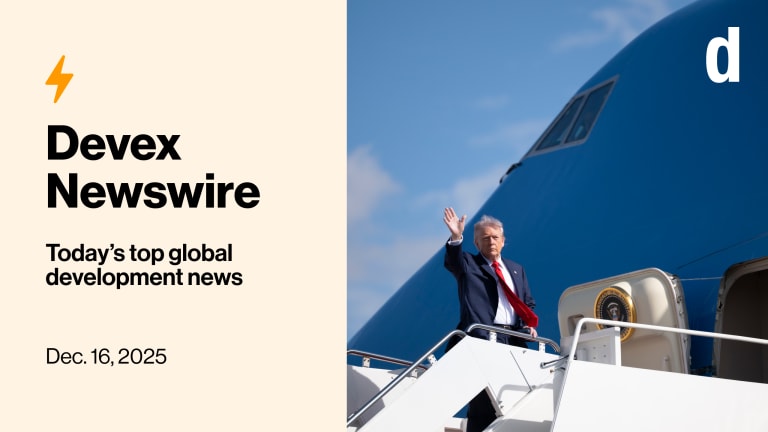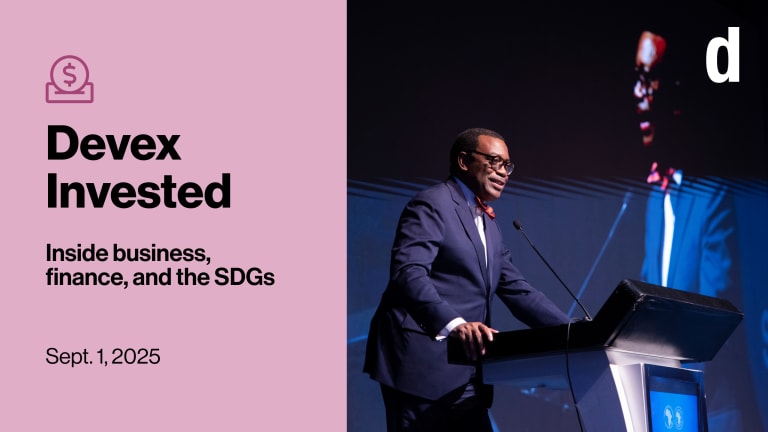
As a bellwether year for global development planning — and financing — gets underway, the international community has plenty of disasters and crises to look back on — and learn from — in the last half decade. Will one of those lessons be the importance of looking ahead?
On Tuesday, U.S. President Obama will deliver his State of the Union address and lay out his vision for progress on a number of issues, both domestic and global. As Devex has reported, 2015 is a make-or-break year on a number of global development fronts.
How resolutely will the president attach his own legacy to those priorities?
Monday marked the five-year anniversary a 7.0 magnitude earthquake devastated Haiti, and the world saw first-hand what happens when a cataclysmic event interacts with weak social and economic systems. More than 300,000 people lost their lives in the quake’s aftermath; despite a massive influx of assistance, the tragedy served as a reminder that the worst time to tackle extreme poverty is after a catastrophe reveals it to the world.
Our coverage this week has shone a spotlight on Haiti — what we’ve learned and where we stand five years after disaster struck on Jan. 12, 2010.
Devex Associate Editor Kelli Rogers highlighted the small victories the global development community has achieved in Haiti in the last half decade, which, taken together, paint a more hopeful picture than what is commonly shown in exposes of inefficiency, waste, and poor coordination.
Jenny Lei Ravelo examined new strategic changes to the United Nations’ approach in Haiti, which place transitions to long-term recovery and resilience interventions front and center for the next two years. Lean Santos dug into the strengths and weaknesses of the global disaster response architecture, highlighting the need for better planning in the early stages of a response effort.
This year, the global community will turn its attention to laying the groundwork for an agenda to prevent disasters like Haiti from happening in the first place — with new goals to balance development with environmental sustainability and a plan to finance them. Obama’s speech on Tuesday may signal how seriously the United States plans to engage in that process (although the administration’s major reform plans — including the 2nd Quadrennial Diplomacy & Development Review — are expected to be announced prior to SOTU).
Two years ago, to the delight of many in the global development community, Obama used his prime-time SOTU address to put his rhetorical stamp of approval on the ambitious goal to end extreme poverty by 2030.
“Progress in the most impoverished parts of our world enriches us all,” Obama told a joint session of Congress at the time.
“The United States will join with our allies to eradicate such extreme poverty in the next two decades by connecting more people to the global economy, by empowering women, by giving our young and brightest minds new opportunities to serve and helping communities to feed and power and educate themselves, by saving the world’s children from preventable deaths and by realizing the promise of an AIDS-free generation, which is within our reach,” he added.
George Ingram, a senior fellow at the Brookings Institution and co-chair of the Modernizing Foreign Assistance Network, pointed out that Obama’s “short-but-sweet” paragraph two years ago acknowledged nine separate commitments to affect change through global development. It also connected those commitments to America’s best interests.
Will Obama be able to convince U.S. lawmakers and citizens that it is in the country’s best interests to support — and to lead — a global goal-setting agenda intended to bridge environmental, social and economic concerns? More to the point, can Obama make the case that the post-2015 development agenda is not just a roadmap for the poorest nations, but one that the United States should also sign on to?
At a recent meeting of the Advisory Committee on Voluntary Foreign Assistance, a group of high-profile business and NGO leaders who consult with the U.S. Agency for International Development, one attendee suggested that the United States, as a signal of its seriousness to lead in post-2015 negotiations and discussions, commit to developing its own “development strategy” for fulfilling the sustainable development goals.
Ingram reiterated the sentiment behind that proposal.
“I would like to see [Obama] acknowledge that this new set of global goals are for all countries and for all peoples, and that we have to make sure that they are relevant not just to developing countries but to Americans,” Ingram told Devex. “We know we’ll get the commitments. The question is will we get the implementation. A commitment to move those goals to implementation for developing countries and americans I think would be a significant statement.”
Any kind of acknowledgement that the United States will sign on to a United Nations-led process could prompt a political backlash from those who reject anything resembling global governance. Still, avoiding hot-button terms like “United Nations,” Ingram said, could allow the president to avoid some of that blowback.
Public opinion on foreign aid may also have changed in recent months.
Less than a year ago, the message coming from American public opinion was one of anti-interventionism. A Wall Street Journal/NBC poll concluded that 47 percent of Americans wanted their country’s government to “to reduce its role in world affairs.” The Ebola virus outbreak in West Africa — and the handful of cases that popped up in the U.S. — might have changed that.
“You saw it in the polls,” Ingram said. “Americans need to keep being reminded that they’re part of a bigger world. ... And unfortunately, the events that remind them are global crises.”
So, as the global community looks back on five years of mixed results in Haiti, with plenty of silver linings and disappointments to reference, will this be the year that global leaders embrace a commitment to looking forward, to what can be done now, by every country, at the intersection of environmental and economic sustainability, to stem crises and catastrophes before they unravel?
We’ll be watching, so stay tuned.
Join the Devex community and access more in-depth analysis, breaking news and business advice — and a host of other services — on international development, humanitarian aid and global health.








